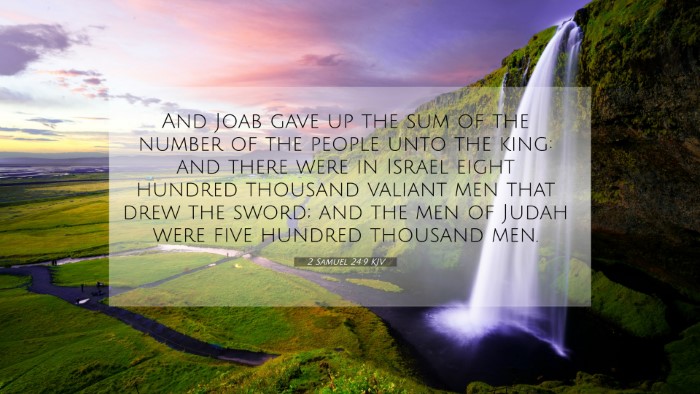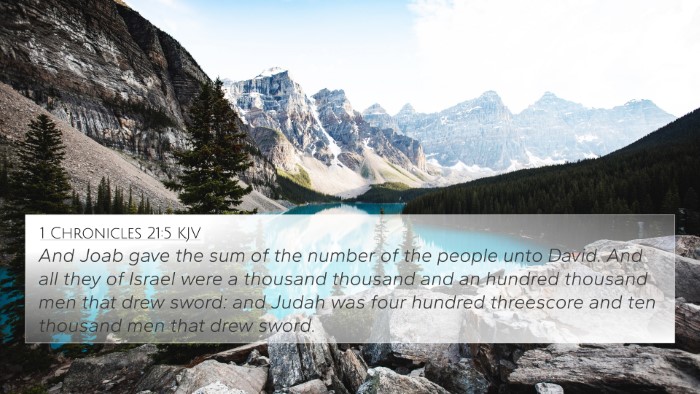Understanding 2 Samuel 24:9
Verse: "And Joab gave up the sum of the number of the people unto the king: and there were in Israel eight hundred thousand valiant men that drew the sword; and the men of Judah were five hundred thousand men."
Contextual Overview
This verse occurs in a tense moment in Israel’s history when King David decides to take a census of his people, a decision that prompts significant consequences according to the biblical narrative. The act itself and its implications are crucial for understanding the themes of pride, judgment, and God's sovereignty.
Commentary Insights
-
Matthew Henry:
Henry emphasizes that this census reflects David’s misstep rooted in pride, showcasing his tendency to rely on military strength rather than on God's provision. This act is seen as an arrogance that draws God's disfavor, leading to severe consequences for Israel.
-
Albert Barnes:
Barnes notes that the numbers given serve not only to highlight the military capabilities of Israel and Judah but also to reveal the ongoing tension between reliance on human resources and divine aid. He explains that the differentiated numbers of Israel and Judah indicate the kingdom's fracture.
-
Adam Clarke:
Clarke delves into the significance of the counts, reflecting on their role in demonstrating God’s judgment over the nation. He also connects the act of counting to themes of accountability and stewardship in biblical governance.
Cross-References
This verse can be linked to various other biblical passages that explore similar themes:
- 1 Chronicles 21:5: Provides a parallel account of the census, highlighting the differences in focus between Chronicles and Samuel.
- Exodus 30:12: Discusses a specific command regarding censuses regarding the implications of accountability to God.
- Psalm 33:16-17: A reminder that true security is not in numbers but in God’s might.
- 1 Samuel 15:22: A contrast between obedience to God versus ritual acts, reflecting David’s failure in this moment.
- Job 31:14: Speaks to the accountability each individual holds before God, fitting seamlessly into the theme of David’s census.
- Micah 6:8: The call to act justly and show mercy, contrasting David’s actions in this passage.
- Isaiah 31:1: A warning against reliance on military power instead of divine protection.
Thematic Connections
The themes that emerge from 2 Samuel 24:9 resonate with several overarching biblical narratives:
- Pride and Humility: David's decision illustrates the dangers of pride.
- National Identity and Responsibility: The numbers reveal the importance of understanding one's national strength in relation to divine favor.
- Divine Judgment: Commentary interpretations highlight how God responds to the actions of leaders both positively and negatively.
Comparative Bible Verse Analysis
2 Samuel 24:9 fits within a broader framework of scriptural connections addressed throughout the Bible. For example, the use of military strength versus God’s providence is illustrated not just in David’s story but also in the narratives around other kings, such as Saul and subsequent leadership in Israel.
Tools for Bible Cross-Referencing
Studying verses such as 2 Samuel 24:9 can be enhanced through various tools:
- Bible Concordance: Helps locate verses and their meanings quickly.
- Bible Cross-Reference Guide: An important tool for comparative study.
- Cross-Reference Bible Study: Effective for deeper theological study.
Conclusion
2 Samuel 24:9 serves as a poignant reminder of the themes of accountability, the danger of pride, and the nature of divine judgment. Engaging with this verse through cross-references and thematic analysis enriches our understanding of its implications within the broader biblical narrative.
SEO Keywords
To assist those searching for deeper understanding, terms including "Bible verse cross-references," "Connections between Bible verses," and "Interpreting Biblical themes through cross-references" will lead to valuable resources and insights related to this and similar verses.





